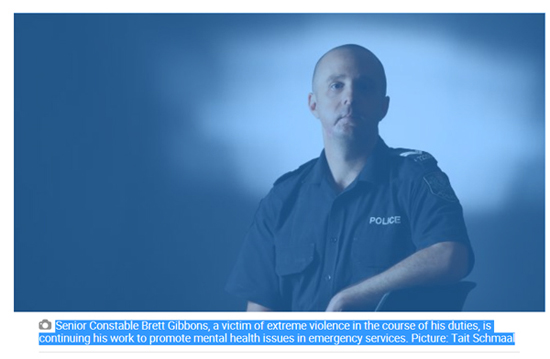Stressed Out Officers, Gone After 8 Years


Police in South Australia are only staying on the job for an average of 8.7 years. The reason for the high turnover? High levels of stress and on the job injuries are forcing more officers to see treatment for mental health issues.
According to a story by Miles Kemp in The Advertiser, a South Australia newspaper, the younger recruits, despite burnout, injuries and stress, are taking fewer sick days but they are leaving the job early. Discounting those officers who retire after reaching age 55, the average police career now lasts less than a decade. The information was released by the agency following a Freedom of Information lawsuit.
Three years ago the average career for officers who resigned or were fired lasted 9.1 years — but in the last financial year that figure had dropped to 7 years.
Senior Constable Brett Gibbons, an emergency services health advocate with the agency aid the figures were in keeping with other Australian police services — officers typically had either had a long-term career or left within a few years because of the pressure of the job.
“There is a saying ‘stay for four or stay for 40 (years)’ which gets banded around a lot,” Gibbons said. “People usually quit after four years because the job doesn’t fit with them for family/pay/lifestyle reasons, or they stick around until retirement,’’ he said. “It makes the average length of service come out to eight or nine years.’’
Brett Gibbons, who was shot in the face while responding to a domestic violence call turned out to be a homicide, recently launched the website www.emergencyarchives.com and Facebook page under the same name to help uniformed workers cope with the stresses of their work.
Police Association of South Australia Secretary Thomas Scheffler said the job of policing was becoming increasingly complex and challenging, but there were numerous initiatives being undertaken to get early help for officers.
“Over the recent decades, far too many police officers have, in one way or another, fallen victim to work-related mental-health issues,’’ Scheffler said. “I think that until now, too few decision-makers have understood the personal impact of police work: dealing so frequently with death, violence, addiction, pedophilia and so on. We’re kidding ourselves if we think these things don’t come with consequences for mental health. Let’s remember that there’s no magical well from which we can just keep drawing more officers as others fall victim to psychological trauma.”
Former police minister Robert Brokenshire said he had inquired about the welfare of police officers because numerous officers had contacted his office seeking help. He said they had told him of the terrible toll stress was taking on themselves and their families.
“You can see from the South Australia Police Services’ own figures there are more and more people leaving at a younger and younger age and that should be a wake-up call to everyone that there is some real stress and suffering out there for officers,’’ Brokenshire said. “They need more support and police work is getting more and more complicated and much harder to just go home, turn off and come back and get on with the job the next day.”
Footnote: Ron DeLord, a leading U.S. police union labor leader, made the following comment about this situation for cops in Australia: “Australia phased out defined benefit pensions over past 25 years in all but one state. Police officers have the same defined contribution plan as civilians. Thus officers can quit whenever they get tired because there is no defined period of time to work. Recruiting and training is endless and the police forces are very young.”














